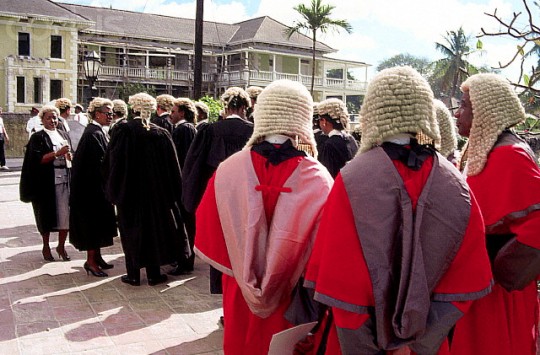Is now the time to remove wig wearing as part of court dress in Africa’s Commonwealth of Nations and those in the Caribbean?
The use of wigs in British courts dates back to the 1680s.
The Commonwealth of Nations is an organization of 54 independent member states. All members except Mozambique and Rwanda were part of the British Empire, out of which the Commonwealth developed. Not all members nations of the Commonwealth’s courts wear wigs.
The BBC reported in 2008 that British judges in civil and family cases in England and Wales have stopped wearing wigs as part of a new dress code. The judges have also started wearing a new simplified design of working robes in court, with the aim of modernizing. Judges and lawyers working on cases in criminal courts will keep their traditional wigs and gowns.
In November 2011 it was announced that lawyers appearing at the United Kingdom’s highest court no longer have to wear traditional dress. The new guidance also applies to lawyers appearing before the Judicial Committee of the Privy Council, which sits at the UK Supreme Court building in Parliament Square, Westminster, opposite the Houses of Parliament. A practice had already been adopted in family cases under which advocates customarily appear unrobed. Supreme Court justices do not wear legal dress themselves. In the Supreme Court the justices themselves wear business suits – as did the Law Lords before them – but until now barristers appearing before them have been required to wear wigs and gowns.
Judges and attorneys in some of Africa’s Commonwealth of Nations and those in the Caribbean still wear wigs.
Some Commonwealth of Nations like: Canada, India, Pakistan. South Africa do not wear wigs.
India gained independence from the United Kingdom on August 15, 1947.
King George VI relinquished the title of Emperor of India in 1947.
Pakistan gained independence from the United Kingdom on August 14, 1947.
From 1947 to 1956, Pakistan was a dominion in the Commonwealth of Nations, under two monarchs. In 1947, King George VI relinquished the title of Emperor of India and became King of Pakistan. Pakistan became an Islamic and republic in 1956. Pakistan left the Commonwealth in 1972 and rejoined 1989. Pakistan was then suspended in 1999 and the suspension lifted in 2004. Pakistan was suspended again in 2007 and had the suspension lifted in 2008.
____________________
Here are some examples
The Bahamas
Independence from the United Kingdom July 10, 1973
Barbados
Independence from the United Kingdom November 30, 1966

The Gambia
Independence from the United Kingdom February 18, 1965
Ghana
Independence from the United Kingdom March 6, 1957
Ghanaian President John Dramani Mahama was sworn in on Monday, January 7, 2013 in Accra, capital of Ghana, for the next four-year tenure after winning elections last month.
Jamaica
Independence from the United Kingdom August 6, 1962
Kenya
Independence from the United Kingdom December 12, 1963
Malawi
Independence from the United Kingdom July 6, 1964
Nigeria
Independence from the United Kingdom October 1, 1960


Sierra Leone
Independence from the United Kingdom April 27, 1961
_________________________________________________________________
Canada
The Constitution Act, 1867 created a federal dominion
The Statute of Westminster 1931 is an Act of the Parliament of the United Kingdom. Passed on December 11, 1931, the Act established legislative equality for the self-governing dominions of the British Empire with the United Kingdom.The statute applied to Canada, the Irish Free State, and South Africa without the need for ratifying measures. Australia adopted the statute in 1942, New Zealand adopted the statute in 1947. Newfoundland, Canada never adopted the statute by request of its government and the United Kingdom resumed direct rule in 1934 and maintained it until Newfoundland became a province of Canada in 1949.
The Canada Act 1982 of the Parliament of the United Kingdom was passed at the request of the Canadian federal government to “patriate” Canada’s constitution, ending the necessity for the country to request certain types of amendment to the Constitution of Canada to be made by the British parliament.
South Africa
Independence from the United Kingdom May 31, 1910
On May 31,1961, following a whites-only referendum, South Africa became a republic and left the British Commonwealth. Queen Elizabeth II ceased to be head of state, and the last Governor-General became State President.
South Africa’s first multi-racial elections in which full enfranchisement was granted were held on April 27, 1994.
United Kingdom

_____
Video: Nigeria
_____
_____
_____
Video: Kenya
_____
Video: Alex Haley ‘ROOTS’ – wigs can be seen in this film
_____
July 12, 2012
Uganda: Judiciary Needs Sh1 Billion for 76 Wigs, MPs Told
By Moses Walubiri
The New Vision
As the Judiciary grapples with an array of problems ranging from financial constraints to shortage of manpower, MPs have heard that it will cost sh1b to procure ceremonial wigs for the 76 justices of the Supreme Court, Court of Appeal and High Court. The secretary to the Judiciary, Dorcus Okalany, told MPs on the legal and parliamentary affairs yesterday that the wigs are a mainstay for justices during special ceremonies. “The justices have got working, but no ceremonial wigs. “This has continued to be a protocol embarrassment because many judges attend ceremonies without being recognised,” Okalany told legislators on Thursday. MPs heard that each wig goes for £4,000 (about sh13.5m) because the manufacturer in the UK has a monopoly. When fully constituted, the Supreme Court has 15 justices, Court of Appeal 11 and High Court 50. Due to financial constraints, however, the number is currently less by 19 justices, with the Supreme Court having 6, Court of Appeal 7 and High Court 44.
________
















































May 12, 2012 at 4:48 am
what was the point of including the ‘negro sale’ ads? smh
July 10, 2016 at 10:50 pm
Time to end the brainwashing fuckry.